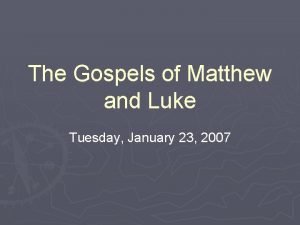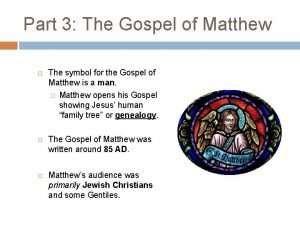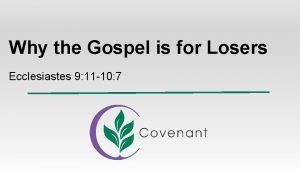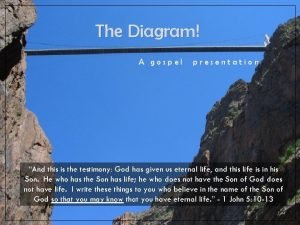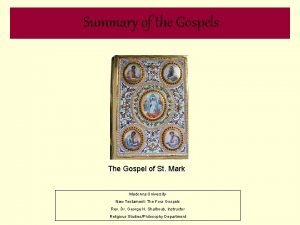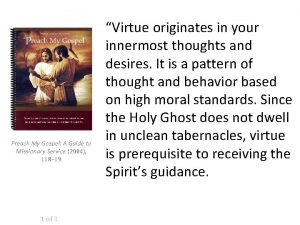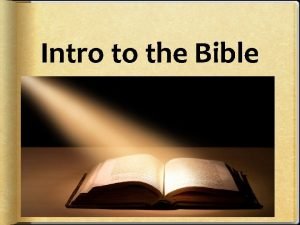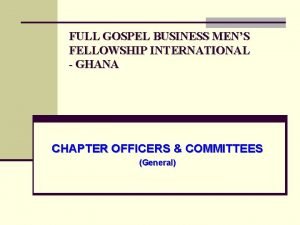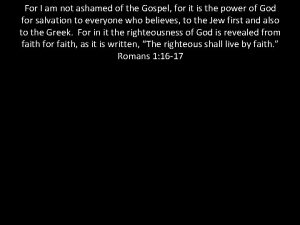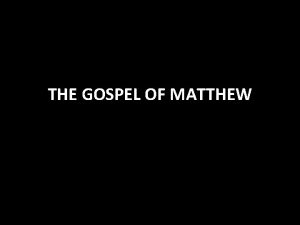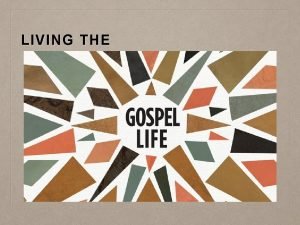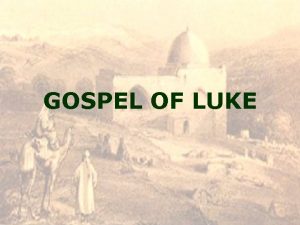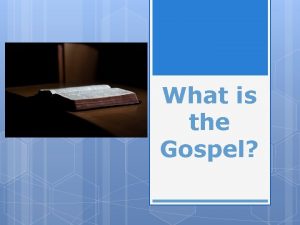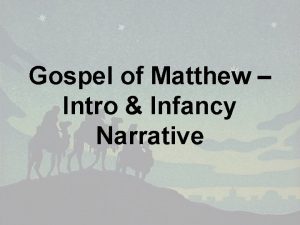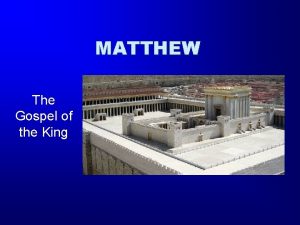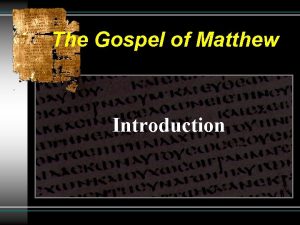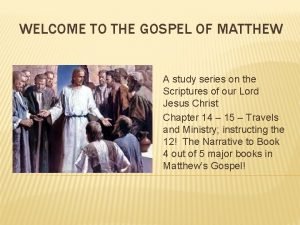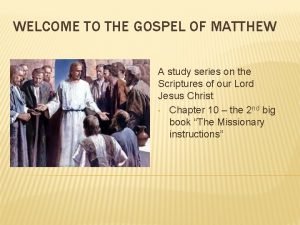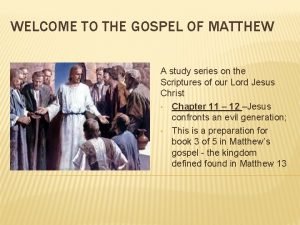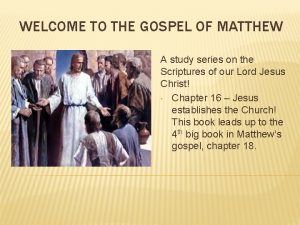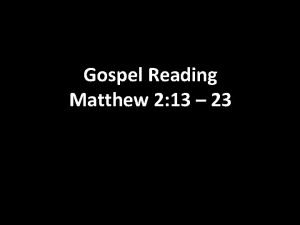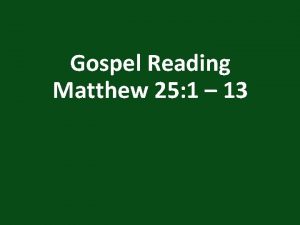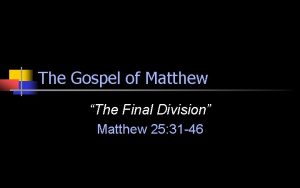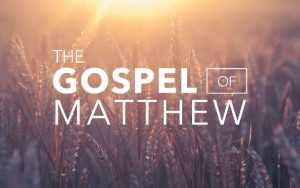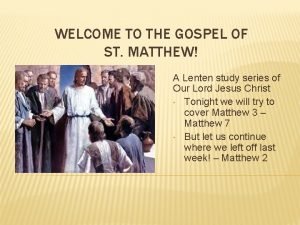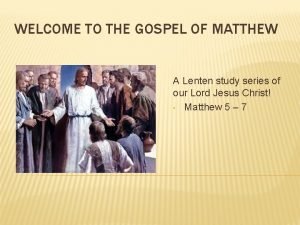WELCOME TO THE GOSPEL OF MATTHEW A study




























































- Slides: 60

WELCOME TO THE GOSPEL OF MATTHEW A study series on the Scriptures of our Lord Jesus Christ Chapter 13 –The Kingdom is defined! Book 3 of 5 major books in Matthew’s Gospel!

BOOK 3 DISCOURSE – KINGDOM PARABLES

CHAPTER 13 – THE THIRD BOOK � Matthew 13 is Jesus’ third discourse. � Book 3 contains a series of parables about the kingdom of heaven. � This section of the kingdom of heaven, ironically, follows the section where Jesus confronts his generation with their failure to repent and receive the good news of the kingdom, and in which the Jewish leaders begin to challenge his authority and power.

CHAPTER 13 – JESUS EXPLAINS THE KINGDOM OF HEAVEN USING 8 PARABLES � Parable of the sower � Parable of the weeds � The mustard seed � The yeast � The treasure in the field � The merchant and the pearl � The parable of the net; sorting fish � The home owner

LET’S GET STARTED! MATTHEW 13: 1 -23 � � I. The Relating of His Parables (13: 1– 8, 18– 33, 36– 50, 52) A. The sower, the seed, and the soil (13: 1– 8, 18– 23) � 1. Information in this parable (13: 1– 8): A farmer sows grain, which falls upon four different kinds of soil, producing four different results. � � � a. Roadside soil (13: 1– 4): This seed is soon devoured by the birds. b. Shallow, rocky soil (13: 5– 6): This seed springs up quickly but soon withers, being scorched by the sun. c. Thorn-infested soil (13: 7) : This seed is quickly choked by the thorns. d. Fertile soil (13: 8) : This seed produces a thirty, sixty, and even hundredfold crop! 2. Interpretation of this parable (13: 18– 23) � � � a. The seed (13: 18– 19 a): The seed represents the Good News about the Kingdom. a. The roadside soil (13: 19 b): The hard soil represents those who hear the message but do not understand it, thus allowing Satan to steal it from them. b. The rocky soil (13: 20– 21): The shallow, rocky soil represents those who have no depth and thus drop out upon encountering any trouble or persecution. c. The thorn-infested soil (13: 22) : The thorny ground represents those who allow the lure of wealth to snuff out the Good News. d. Fertile soil (13: 23) : The good soil represents those who truly accept God’s message, producing an abundant harvest.

THE REASON FOR PARABLES SANDWICHED IN BETWEEN – MATT. 13: 1 -23 � II. The Reason for His Parables (13: 9– 17, 34– 35, 51) � A. The purpose (13: 9– 13, 34– 35, 51): Jesus uses his parables to accomplish a twofold goal. � 1. To reveal God’s truth to the righteous (13: 9– 12 a, 34– 35, 51) � 2. To conceal God’s truth from the unrighteous (13: 12 b– 13) � B. The prophecy (13: 14– 17): Isaiah predicted that Israel would not be able to understand or accept the truths in Christ’s parables (Isa. 6: 9– 10).

WHY THE USE OF PARABLES? � This chapter is filled with parables that Jesus told about the kingdom of heaven. � The Greek word for parable is parabole – meaning “a place beside”. � In the gospels, it is a comparison from everyday life that is used to illustrate a spiritual truth. What reason did Jesus for using parables? � Thoughts? Comments? Look at Mat. 13: 10 -16 for an answer

WHY DID JESUS USE PARABLES? � In verses 10 -16, some truths are known only by revelation from God. � Those unwilling to receive Jesus’ message are unable to see the truth in the parables. � In contrast, the hidden meanings challenge the sincerely interested to further inquiry. � Because our Lord spoke in parables does not reflect intent to confuse the people, but the sad truth that those who are not willing to receive Jesus’ message will find the truth hidden from them.

MORE ON THIS QUESTION WHY PARABLES? � Jesus spoke in parables because the people’s hearts are “dull” vs. 15. � Their eyes do not see the truth before them, and their ears don not hear it. � The Lord’s quote refers back to Is. 6, in which Isaiah is called by God to pronounce judgment on Israel for her spiritual deterioration and infidelity. � They too disregarded the signs before them and their hearts had become dull and hardened by sin. Jesus speaks in parables to reveal the ignorance of the people and to awaken them.

VARIOUS REASONS FOR PARABLES? � Parables are used for different reasons; � Punishment � Not everyone is ready to hear � To make complicated things simple � Stories help us to relate � To you it has been given the secrets of heaven � Not to make things clear, but forewarn of judgment

ANOTHER QUESTION � What was given to the disciples but not to the crowd, and why? � Look at verses 11 -17 for an answer, � Look at Catechism 546 for another answer � Thoughts? � Comments?

ONE POSSIBLE ANSWER � Only the disciples were given the knowledge of the secrets of the kingdom of heaven. � They were given spiritual understanding: not necessarily that they understand immediately, but they were open and receptive to Jesus’ teachings. � The disciples embraced Jesus and his life, and thus are made aware of to the secrets of the kingdom.

CATECHISM 546 ADDS � The catechism explains that the parables hold a kind of mirror up to those who listen. � Their response reveals whether the soil of their hearts is receptive to the Word of God, or whether it is hard and stony and hostile to it. � One might enter the Kingdom to know its secrets. However, for those who remain outside, everything remains unknowable.

ANOTHER QUESTION TO CONSIDER � According to Jesus‘ interpretation of the parable of the sower in verses 18 -23, to what do each of the following refer? � I. The seed that fell along the path � II. The seed that fell among rocks � III. The seed that fell among thorns � IV. The seed that feel on good soil

THE SEED THAT FELL ALONG THE PATH � The seed that fell along the path – � This refers to the hardened heart that heard the message and did not understand, so that the evil one snatched it away.

THE SEED THAT FELL AMONG ROCKS � The seed that fell among rocks – � This refers to the shallow heart that received the Word with joy but did not allow it to take root. So it quickly fell away under trouble, torment, or persecution.

THE SEED THAT FELL AMONG THORNS � The seed that fell among thorns – � This represents the strangled heart that received the Word but allowed it to be choked away and rendered unfruitful by the worries of life, or the deceitfulness of wealth.

THE SEED THAT FEEL ON GOOD SOIL � The seed that feel on good soil – � This refers to the believing heart that heard the Word, and understood the Word, and the seed rooted and grew and flourished and produced a bounteous crop.

WHAT IS THE MAIN MESSAGE OF THIS PARABLE OF THE SOWER AND THE SEEDS? � The parable of the sower explains why the message of the gospel is not always popular: � It is the fault of the hearers, not of the message. � It also says that the ultimate growth of the kingdom from the few who do hear with understanding will be beyond all proportion to the initial planting

WHY THIS PARABLE? � Just as plants depend on good, prepared soil to grow properly, so the kingdom will grow only in those people whose hearts are prepared to receive it. � Some seeds fall on hearts as hard-packed roads and without understanding as the path. � These seeds make no impression on the soil at all, but are snatched up by the birds – the evil one.

THE SHALLOW? � Others fall on very shallow soil that lies on top of the rock: � On hearts that are capable of receiving the message with joy, but which are too hard inside to allow it to become rooted � When that new plant faces troubles or persecution due to its new – found faith, it is not strong enough to last.

THE CHOKED? � Still more seed falls on hearts that are not hardened, but full of worries and care for material things. � These weeds allowed to remain, eventually choke out the new life.

THE RICH? � Only the seed that is received by hearts that fully understand its import achieve full potential. � It grows in rich soil and produces a crop that multiplies far beyond itself.

ONE MORE QUESTION? � Why is the Word of God not always effective in our lives? What is Jesus trying to show us in this parable? Thoughts? � Comments? � 1 Thess. 2: 13 – And for this reason we too give thanks to God unceasingly, that, in receiving the word of God from hearing us, you received not a human word but, as it truly is, the word of God, which is now at work in you who believe. � Hebrews 4: 2 - For in fact we have received the good news just as they did. But the word that they heard did not profit them, for they were not united in faith with those who listened. �

ONE POSSIBLE ANSWER � The seed of the Word is not a “magic bullet”. God’s grace requires our cooperation to take effect. � The Word must be digested and pondered, not just read – as St. Paul tells us in Colossians 3: 16 – “May the Word of God dwell in you richly. ” � According to 1 Thess. 2: 13 – the Word must be accepted as the actual Word of God which is at work in those who believe � The Word is God speaking, � Hebrews 4: 2 concurs, saying that the gospel is of no value to the hearer who does not combine it with faith.

ANOTHER REASON… � That the Word of God is not always effective in our lives is that sin can obscure our vision so that we cannot receive the Word of God. � St. Jerome – “We, in the flesh of Christ, which is the word of divine doctrine, or the interpretation of the Sacred Scriptures, receive manna in accordance with and in proportion to our desire. ” � If you are a saint, you will find refreshment; � If you are a sinner, you will find anguish.

SOWING IN VS. 3 -8 � In Palestine, sowing often preceded plowing, much of the seed is scattered on ground that is unsuitable. � While, much is wasted, the seed that falls on good ground bears fruit in large quantities. � The point of this parable is that, in spite of some failure because of opposition and indifference, the message of Jesus about the coming of the kingdom will have enormous success.

UNDERSTANDING IS A GIFT � This parable demands reflection for understanding, only those who are prepared to explore its meaning can come to know it. � Understanding is a gift of the Holy Spirit

THE SECRETS OF THE KINGDOM IN VS. 11 � What are these secrets? � The inner disciples of Jesus accept with faith and are privileged to know God’s mysteries – vs. 3643 � Jesus’ private instruction of his disciples reflects his intention to arrange the Church hierarchically. � He invests his authority in the apostles and their successors to administer sacraments and transmit God’s truth through their teaching

THE PARABLE OF THE SOWER – VS. 18 -23 � This parable illustrates how indifferent responses to the word of the kingdom – vs. 19 prove unfruitful – Catechism 29 � Distractions come from � The world – vs. 22 � The flesh – vs. 21 � And the devil – vs. 19 � On the other hand, fruit brought forth from the responsive heart abounds – vs. 23.

PARABLE OF THE WEEDS – 13: 24 -30, 36 -43 � B. The wheat and the thistle (13: 24– 30, 36– 43) � 1. Information in the parable (13: 24– 30) � a. The diligence of a sower (13: 24) : A farmer sows good seed throughout his field. � b. The discovery by the sower (13: 25– 28): He learns his enemy later secretly visited the field and sowed thistles among the wheat. � c. The dilemma of the sower (13: 29) : He knows that if he attempts to pull out the thistles, he will also harm the wheat. � d. The decision of the sower (13: 30) : He will wait until harvest time, when he will sort out the thistles from the wheat and burn them.

INTERPRETATION OF THE WEEDS � 2. Interpretation of the parable (13: 36– 43) � a. The sower is Christ the Son of Man (13: 36– 37). � b. The enemy is the devil (13: 39 a). � c. The field is the world (13: 38 a). � d. The good seed is believers (13: 38 b). � e. The thistles are unbelievers; sons of the evil one (13: 38 c). � f. The harvest is the end of the age (13: 39 b). � g. The reapers are angels (13: 39 c– 41). � h. The granary is heaven (13: 43). � i. The furnace is hell (13: 42)

THINKING CAPS? � What will happen to those who cause sin and to all who do evil? What will happen to the righteous? � All of this is according to our Lord in this parable! � Yet many do not believe in sin or hell? � Thoughts? � Comments?

THE ANSWER � Those that cause sin and do evil � will be pulled up, � weeded out, � and thrown into the fiery furnace � and left to “weep and gnash their teeth” – vs. 42. � In contrast, “the righteous will shine like the sun in the kingdom of their Father. – vs. 43

ANOTHER QUESTION? � How does this parable apply to the church today? You might want to ask yourself who is responsible for pulling the “weeds”? � Thoughts? � Comments?

THE ANSWER IS FOUND IN THE CATECHISM 827 AND 681 -682 � The children of the kingdom are not perfect. � They are at the same time holy and in need of purification, and sin and good will be mixed in each until the end. � Just as the weeds and good plants are left to mingle until the harvest in this parable, there will always be sinners in the Church and even among her ministers. � Some will ask, “why don’t we clean house? ”

HOUSE CLEANING? � Why won’t we clean house of all the sinful people and imperfect ministers? � In reality they are saying, “pull all the weeds now!” � But it is not our responsibility to do this. Like Jesus, the Church claps sinners to her bosom until the end of time when Christ will return to judge the world according to each person’s works and their acceptance or refusal of God’s grace.

VERSES 36 -43 � This section speaks of a final separation of good and evil. � Accordingly, God’s forbearance toward sin and evil in the world will last only until the Last Judgment; � In the meantime, saints and sinners will continue to sit side by side in the church.

WHAT IS GOING ON IN VERSE 36? � Jesus left the crowds and went into the house. What is this all about? � Jesus shifts attention from the great crowds (13: 2) to his private instruction of disciples � The crowds could represent unbelieving Israel. From now on in this book, Jesus is more and more directed toward his disciples to give them instructions. � Everything disciples. beyond this is addressed only to his

FOUR MORE PARABLES – VS. 31 -35, 44 -46 � A. The mustard seed (13: 31– 32) 1. It goes into the ground the smallest of seeds (13: 31 – 32 a). � 2. It grows out of the ground the largest of plants (13: 32 b). � � B. The yeast (13: 33) 1. It is placed in the flour (13: 33 a): Only a small amount of yeast is used. � 2. It permeates every part of the dough (13: 33 b). � � C. The purpose (13: 9– 13, 34– 35, 51): Jesus uses his parables to accomplish a goal. � 1. To reveal God’s truth to the righteous (13: 9– 12 a, 34 – 35, 51)

VS. 44 -46 � D. The treasure in the field (13: 44) � 1. The discovery (13: 44 a): A man finds a precious treasure. � 2. The delight (13: 44 b): He is overjoyed at what he finds. � 3. The decision (13: 44 c): He sells all that he has to buy the field. � E. The merchant and the pearl (13: 45– 46) � 1. He seeks this pearl (13: 45). � 2. He buys this pearl (13: 46).

IN VS. 31 -46, JESUS TELLS 4 MORE PARABLES � What is the connection between the kingdom of heaven and the mustard seed and the way it grows? � Thoughts? � Comments?

ONE POSSIBLE ANSWER � Although the kingdom of heaven begins small like a tiny mustard seed with just Jesus and 12 disciples, it like the mustard tree will grow to be very large into a world wide Church. � On a side note: the image of a tree with birds resting in its branches may allude to Dan. 4: 21, which suggests world dominion of a kingdom that will provide rest for people of all nations.

SIMILAR OT METAPHORS USED � Trees used to represent great empires in the OT are found in Ez. 31: 1 -13 and Dan. 4: 12 ff. � In these instances, birds represent the Gentile nations. � Jesus uses this parable to indicate the spread of the gospel, and acceptance of Gentiles into the church.

YEAST? � How does Jesus use yeast to expand our understanding of the kingdom? � Thoughts? � Comments?

SMALL AMOUNT USED IN THE WORLD? � Just a small amount of yeast will leaven a large amount of meal (three measures would provide bread for more than a hundred people). � So the kingdom, though small when planted, will penetrate and expand to give life and spiritual food to many. � Yeast represents the grace of kingdom that sanctifies the world through the church. � Yeast is a call to bring the gospel message to those who are gathered around our Lord and to us.

2 MORE PARABLES? � What is the lesson taught by the two parables in 13: 44 -46? � The kingdom of heaven is likened first to a treasure hidden in a field and then to a pearl of great price, both of which were purchased by someone who sold everything to buy them. � Both parables teach that the kingdom is of such great value that you should be willing to give up everything you have to gain it.

STILL MORE? � It is interesting that Jesus uses two parables to get the point across, when the fact that the kingdom of heaven is of great value should be obvious. Perhaps the focus is as much on the cost as the value: � Jesus wants his disciples so convinced of the kingdom’s value, they will be willing to give up everything to gain it.

ST. IRENAEUS APPLIES THESE PARABLES THIS WAY � Christ himself is the great treasure hidden within the field of the OT Scriptures. � Only in light of his cross and resurrection can the mysteries of the Old be fully understood to announce the advent of God’s Son.

MATTHEW 13: 47 -58 OUTLINE � A. The sorting of fish (13: 47– 50) � � 1. The information in this parable (13: 47– 48): Upon catching a net filled with fish, the fishermen sort out the good from the bad. 2. The interpretation of this parable (13: 49– 50): At the end of the world, the angels will likewise separate the righteous from the wicked. B. The homeowner and his treasure (13: 52): A wise teacher of God’s Word can display both old and new precious truths (Old and New Testament) like a homeowner can show off both old and new treasures. C. The Reaction to His Parables (13: 53– 58): The people in Jesus’ hometown of Nazareth react to his parables in a twofold way. � � 1. First they are amazed (13: 53– 56). 2. Then they are angered (13: 57– 58): Jesus does only a few miracles there because of their unbelief.

THINKING HATS? � In 13: 47 -52, what does the parable of the net tell us about the judgment to come? � Thoughts? � Comments?

ANSWER � The message in this parable is similar to that in the weed parable. � It is not for us to separate the wicked and the righteous. In the day of judgment, the angels will gather everyone as a fisherman would gather a load in a fishing net, then separate the wicked from the righteous and throw them into the furnace.

MORE ON THIS PARABLE OF JUDGING? � This parable ties in with Jesus’ earlier admonition to “judge not. ” (7: 1) � It acknowledges that we are all sinners, that there is good and bad in all of us and at any single point in our life it may be hard to tell whether we are weed or wheat. � It is not for us – or even for the Church – to judge anyone’s final destination, which will not be known or revealed until the day of Judgment.

13: 54 – WHY WERE THE PEOPLE OF JESUS’ HOMETOWN AMAZED AT HIM? � These were the people that Jesus grew up with. They knew his family as ordinary people like the rest of them. � They couldn’t understand where he got his wisdom and the power to do miracles (or perhaps some were jealous of him)

COMPARE AND CONTRAST � How do the people in 13: 54 that were amazed at him differ from the crowd that was amazed in 7: 28? � 7: 28 - When Jesus finished these words, the crowds were astonished at his teaching, for he taught them as one having authority, and not as their scribes � Thoughts? � Comments?

A BIG DIFFERENCE � As we look at the amazements they are different even though both are amazed � The earlier crowd was amazed at his authority and listened to him. � The later hometown crowd took offense at him and did not believe in him.

CONSEQUENCE � So what was the consequences for their unbelief? � As a consequence of their unbelief, Jesus refrained from doing many miracles in his home town, and he would eventually move on to other places.

CHAPTER 13 APPLICATION � There are some things here to ponder: � Is your heart like the “good soil” in which the seed of the Word can grow readily? � You might look at different aspects of your life in light of the soil described in Matthew 13: � Is the soil of your marriage receptive to the Word? � Is the soil of your moral life receptive to the Word? � Or are your hearts rocky and unreceptive, or choked with care? � What can you do to make sure you hear and understand bear fruit?

BOOK 3 WRAP-UP � As we look at book 3 of Matthew’s gospel, which is chapters 11 -13, let us reflect together on some questions � What kind of opposition did Jesus face when he began to establish his kingdom? � How did the Lord Jesus confront the religious leaders? � What was the purpose of the parables that he used?

 Date of matthew's gospel
Date of matthew's gospel Matthew gospel symbol
Matthew gospel symbol Carolingian art characteristics
Carolingian art characteristics Wise men three clever are we
Wise men three clever are we Hurricane matthew case study
Hurricane matthew case study Hình ảnh bộ gõ cơ thể búng tay
Hình ảnh bộ gõ cơ thể búng tay Lp html
Lp html Bổ thể
Bổ thể Tỉ lệ cơ thể trẻ em
Tỉ lệ cơ thể trẻ em Gấu đi như thế nào
Gấu đi như thế nào Glasgow thang điểm
Glasgow thang điểm Alleluia hat len nguoi oi
Alleluia hat len nguoi oi Các môn thể thao bắt đầu bằng tiếng nhảy
Các môn thể thao bắt đầu bằng tiếng nhảy Thế nào là hệ số cao nhất
Thế nào là hệ số cao nhất Các châu lục và đại dương trên thế giới
Các châu lục và đại dương trên thế giới Công thức tính thế năng
Công thức tính thế năng Trời xanh đây là của chúng ta thể thơ
Trời xanh đây là của chúng ta thể thơ Mật thư tọa độ 5x5
Mật thư tọa độ 5x5 Phép trừ bù
Phép trừ bù độ dài liên kết
độ dài liên kết Các châu lục và đại dương trên thế giới
Các châu lục và đại dương trên thế giới Thơ thất ngôn tứ tuyệt đường luật
Thơ thất ngôn tứ tuyệt đường luật Quá trình desamine hóa có thể tạo ra
Quá trình desamine hóa có thể tạo ra Một số thể thơ truyền thống
Một số thể thơ truyền thống Cái miệng bé xinh thế chỉ nói điều hay thôi
Cái miệng bé xinh thế chỉ nói điều hay thôi Vẽ hình chiếu vuông góc của vật thể sau
Vẽ hình chiếu vuông góc của vật thể sau Thế nào là sự mỏi cơ
Thế nào là sự mỏi cơ đặc điểm cơ thể của người tối cổ
đặc điểm cơ thể của người tối cổ V. c c
V. c c Vẽ hình chiếu đứng bằng cạnh của vật thể
Vẽ hình chiếu đứng bằng cạnh của vật thể Vẽ hình chiếu vuông góc của vật thể sau
Vẽ hình chiếu vuông góc của vật thể sau Thẻ vin
Thẻ vin đại từ thay thế
đại từ thay thế điện thế nghỉ
điện thế nghỉ Tư thế ngồi viết
Tư thế ngồi viết Diễn thế sinh thái là
Diễn thế sinh thái là Các loại đột biến cấu trúc nhiễm sắc thể
Các loại đột biến cấu trúc nhiễm sắc thể Số.nguyên tố
Số.nguyên tố Tư thế ngồi viết
Tư thế ngồi viết Lời thề hippocrates
Lời thề hippocrates Thiếu nhi thế giới liên hoan
Thiếu nhi thế giới liên hoan ưu thế lai là gì
ưu thế lai là gì Hổ đẻ mỗi lứa mấy con
Hổ đẻ mỗi lứa mấy con Sự nuôi và dạy con của hươu
Sự nuôi và dạy con của hươu Sơ đồ cơ thể người
Sơ đồ cơ thể người Từ ngữ thể hiện lòng nhân hậu
Từ ngữ thể hiện lòng nhân hậu Thế nào là mạng điện lắp đặt kiểu nổi
Thế nào là mạng điện lắp đặt kiểu nổi Gospel the loser
Gospel the loser Original gospel manuscripts
Original gospel manuscripts Gospel of barnabas muhammad
Gospel of barnabas muhammad 7 signs gospel of john
7 signs gospel of john What is the gospel
What is the gospel Gospel diagram
Gospel diagram Mark gospel summary
Mark gospel summary Peletak dasar voc
Peletak dasar voc Preach my gospel chapter 3
Preach my gospel chapter 3 Opening prayer
Opening prayer Contextualist vs fundamentalist
Contextualist vs fundamentalist Full gospel businessmen fellowship international - ghana
Full gospel businessmen fellowship international - ghana Full gospel businessmen fellowship
Full gospel businessmen fellowship For i am not ashamed of the gospel
For i am not ashamed of the gospel
